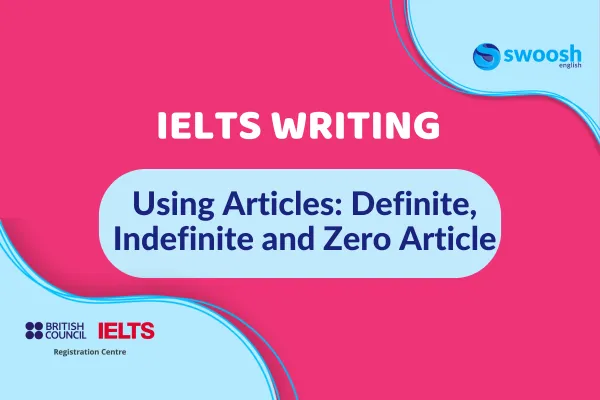Blog
Browse our library of helpful articles

Using Articles: Definite, Indefinite and Zero Article
The correct use of articles in English is crucial for achieving a high score in your IELTS Writing exam, particularly in the areas of grammatical range and accuracy. This blog post will explain how to use definite and indefinite articles, as well as when to omit articles altogether (zero article). Let's explore these concepts in detail.
Definite Article (the)
The definite article "the" is used with both countable and uncountable nouns. Its primary functions include:
Referring to something previously mentioned or known.
Example: The politician is believed to be a senior member of the ruling party.
Referring to a specific example within a general concept.
Example: I decided to throw away the books I used at university.
Referring to unique entities.
Example: The Earth moves around the sun.
While these are the main uses of "the," there are additional nuances that learners should grasp. Here's an exercise to reinforce your understanding.
Exercise 1
Match the following examples (1-5) with their corresponding explanations (A-E).
The meat we bought at the local butcher’s is much nicer than the meat from the supermarket.
No device better represents modern society than the mobile phone.
The standard of living in all three countries has risen.
The biggest increase was in the sale of computers.
I think the rich should pay more tax.
Used to refer to a general class rather than a specific example of that class
Can be used before a superlative
You can use before an uncountable noun to refer to a specific example
With an adjective when we talk about particular groups of people
Before an abstract noun to describe a situation, profess or change. This is often followed by ‘of something’
Indefinite Article (a/an)
The indefinite article "a/an" is used with singular countable nouns and serves various purposes:
Introducing a person or object for the first time.
Example: Police have arrested a politician on suspicion of fraud.
Referring to something in a general or nonspecific manner.
Example: I’m thinking of buying a car.
Indicating an example of a category.
Example: The tiger in our local zoo is an Indian tiger.
Quantifying an individual quantity of an uncountable noun.
Example: She has a wide range of knowledge on this matter.
Zero Article
The zero article is used in specific contexts, including:
Proper names, meals, days, months, seasons, sports, games, and many geographical names.
Example: My name is Roger Rabbit.
Plural nouns when referring generally to people or things.
Example: Computers have dramatically changed our lives.
Prepositional phrases in certain situations.
Example: I learned this poem by heart.
Now, let's reinforce your understanding with some more exercises.
Exercise 2
Choose the correct form of the article (a, an, or zero) for each sentence.
This gives a/an/z really useful information.
We have made a/an/z progress.
It travels at 100 km a/an/z hour
A/An/z analysis of the results shows that ….
This is a/an/z evidence of how effective the system is.
Exercise 3
Read the following essay and insert the appropriate articles where needed.
In my opinion, teenagers are more likely to accept advice from someone who can speak from experience. In other words, listening to what life of crime really means from ex-criminals would be far more likely to persuade young people not to commit crime than any of alternative methods. There are case studies to support this view. For example, Italian Government successfully used ex-mafia members in Naples, well-known mafia-dominated city, to educate youngsters about crime risks. As result of this strategy, there was dramatic reduction in teenage criminal activity.
Alternatives to using reformed criminals to educate teenagers about crime would be much less effective. Some face-to-face alternatives such as using teachers or police officers are likely to fail to make significant impact because of negative image such authority figures have in minds of young people, mainly due to influence of TV and movies. It is reasonable to ask how listening to people who are distrusted or disliked can discourage teenagers from breaking law? In fact, it might instead unintentionally have opposite effect. Another method is to show educational films, but these are often boring for intended audience, who tend not to be interested in documentary broadcasting style. In my country, for instance, people used to make jokes about educational program that dealt with crime effects on young people; after showing of this program, teenager crime rates actually rose.
In conclusion, I fully support view that people who have turned their lives around after serving prison sentence could be used to deter teenagers from committing crimes. I hope the above has given you a better understanding of this tricky area of grammar.
Answers
Exercise 1:
1-C; 2-A; 3-E; 4-B; 5-D
Exercise 2:
1- z; 2- z; 3-an; 4-An; 5-z
Exercise 3:
In my opinion, teenagers are more likely to accept advice from someone who can speak from experience. In other words, listening to what (a) life of crime really means from ex-criminals would be far more likely to persuade young people not to commit (a) crime than any of (the) alternative methods. There are case studies to support this view. For example, (the) Italian Government successfully used ex-mafia members in Naples, (a) well-known mafia-dominated city, to educate youngsters about (the) crime risks. As (a) result of this strategy, there was (a) dramatic reduction in teenage criminal activity.
Alternatives to using reformed criminals to educate teenagers about crime would be much less effective. Some face-to-face alternatives such as using teachers or police officers are likely to fail to make (a) significant impact because of (the) negative image such authority figures have in (the) minds of young people, mainly due to (the) influence of (the) TV and movies. It is reasonable to ask how listening to people who are distrusted or disliked can discourage teenagers from breaking (the) law? In fact, it might instead unintentionally have (the) opposite effect. Another method is to show educational films, but these are often boring for (the) intended audience, who tend not to be interested in (the) documentary broadcasting style. In my country, for instance, people used to make jokes about (an) educational program that dealt with (the) crime effects on young people; after (the) showing of this program, teenager crime rates actually rose.
In conclusion, I fully support (the) view that people who have turned their lives around after serving (a) prison sentence could be used to deter teenagers from committing crimes. I hope the above has given you a better understanding of this tricky area of grammar.
Over to you to start practicing your use of articles in your IELTS preparation. Let us know if you have any questions in the comments below.

Using Articles: Definite, Indefinite and Zero Article
The correct use of articles in English is crucial for achieving a high score in your IELTS Writing exam, particularly in the areas of grammatical range and accuracy. This blog post will explain how to use definite and indefinite articles, as well as when to omit articles altogether (zero article). Let's explore these concepts in detail.
Definite Article (the)
The definite article "the" is used with both countable and uncountable nouns. Its primary functions include:
Referring to something previously mentioned or known.
Example: The politician is believed to be a senior member of the ruling party.
Referring to a specific example within a general concept.
Example: I decided to throw away the books I used at university.
Referring to unique entities.
Example: The Earth moves around the sun.
While these are the main uses of "the," there are additional nuances that learners should grasp. Here's an exercise to reinforce your understanding.
Exercise 1
Match the following examples (1-5) with their corresponding explanations (A-E).
The meat we bought at the local butcher’s is much nicer than the meat from the supermarket.
No device better represents modern society than the mobile phone.
The standard of living in all three countries has risen.
The biggest increase was in the sale of computers.
I think the rich should pay more tax.
Used to refer to a general class rather than a specific example of that class
Can be used before a superlative
You can use before an uncountable noun to refer to a specific example
With an adjective when we talk about particular groups of people
Before an abstract noun to describe a situation, profess or change. This is often followed by ‘of something’
Indefinite Article (a/an)
The indefinite article "a/an" is used with singular countable nouns and serves various purposes:
Introducing a person or object for the first time.
Example: Police have arrested a politician on suspicion of fraud.
Referring to something in a general or nonspecific manner.
Example: I’m thinking of buying a car.
Indicating an example of a category.
Example: The tiger in our local zoo is an Indian tiger.
Quantifying an individual quantity of an uncountable noun.
Example: She has a wide range of knowledge on this matter.
Zero Article
The zero article is used in specific contexts, including:
Proper names, meals, days, months, seasons, sports, games, and many geographical names.
Example: My name is Roger Rabbit.
Plural nouns when referring generally to people or things.
Example: Computers have dramatically changed our lives.
Prepositional phrases in certain situations.
Example: I learned this poem by heart.
Now, let's reinforce your understanding with some more exercises.
Exercise 2
Choose the correct form of the article (a, an, or zero) for each sentence.
This gives a/an/z really useful information.
We have made a/an/z progress.
It travels at 100 km a/an/z hour
A/An/z analysis of the results shows that ….
This is a/an/z evidence of how effective the system is.
Exercise 3
Read the following essay and insert the appropriate articles where needed.
In my opinion, teenagers are more likely to accept advice from someone who can speak from experience. In other words, listening to what life of crime really means from ex-criminals would be far more likely to persuade young people not to commit crime than any of alternative methods. There are case studies to support this view. For example, Italian Government successfully used ex-mafia members in Naples, well-known mafia-dominated city, to educate youngsters about crime risks. As result of this strategy, there was dramatic reduction in teenage criminal activity.
Alternatives to using reformed criminals to educate teenagers about crime would be much less effective. Some face-to-face alternatives such as using teachers or police officers are likely to fail to make significant impact because of negative image such authority figures have in minds of young people, mainly due to influence of TV and movies. It is reasonable to ask how listening to people who are distrusted or disliked can discourage teenagers from breaking law? In fact, it might instead unintentionally have opposite effect. Another method is to show educational films, but these are often boring for intended audience, who tend not to be interested in documentary broadcasting style. In my country, for instance, people used to make jokes about educational program that dealt with crime effects on young people; after showing of this program, teenager crime rates actually rose.
In conclusion, I fully support view that people who have turned their lives around after serving prison sentence could be used to deter teenagers from committing crimes. I hope the above has given you a better understanding of this tricky area of grammar.
Answers
Exercise 1:
1-C; 2-A; 3-E; 4-B; 5-D
Exercise 2:
1- z; 2- z; 3-an; 4-An; 5-z
Exercise 3:
In my opinion, teenagers are more likely to accept advice from someone who can speak from experience. In other words, listening to what (a) life of crime really means from ex-criminals would be far more likely to persuade young people not to commit (a) crime than any of (the) alternative methods. There are case studies to support this view. For example, (the) Italian Government successfully used ex-mafia members in Naples, (a) well-known mafia-dominated city, to educate youngsters about (the) crime risks. As (a) result of this strategy, there was (a) dramatic reduction in teenage criminal activity.
Alternatives to using reformed criminals to educate teenagers about crime would be much less effective. Some face-to-face alternatives such as using teachers or police officers are likely to fail to make (a) significant impact because of (the) negative image such authority figures have in (the) minds of young people, mainly due to (the) influence of (the) TV and movies. It is reasonable to ask how listening to people who are distrusted or disliked can discourage teenagers from breaking (the) law? In fact, it might instead unintentionally have (the) opposite effect. Another method is to show educational films, but these are often boring for (the) intended audience, who tend not to be interested in (the) documentary broadcasting style. In my country, for instance, people used to make jokes about (an) educational program that dealt with (the) crime effects on young people; after (the) showing of this program, teenager crime rates actually rose.
In conclusion, I fully support (the) view that people who have turned their lives around after serving (a) prison sentence could be used to deter teenagers from committing crimes. I hope the above has given you a better understanding of this tricky area of grammar.
Over to you to start practicing your use of articles in your IELTS preparation. Let us know if you have any questions in the comments below.
© 2023 - All Rights Reserved

